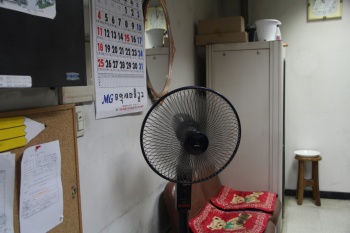
According to a report from the Seoul Metropolitan Government in May 2013, the consumption of energy by universities in 2011 and 2012 outstripped those of hotels and department stores. In addition, 21 out of 54 universities in Seoul turned out to be energy-guzzling institutions. In the case of Seoul National University (SNU), the total use of energy amounts to 44,038 TOE (Ton of Oil Equivalent), resulting in SNU being the place that spends the most energy in Seoul. Yonsei University and Korea University (KU) also made the top ten list, ranking 8th and 10th respectively.
However, this summer, universities are actively reducing electricity consumption on account of government policy.
SNU turns on and off air conditioning in 30 minute-intervals and even shuts down the cooling device when the electric power reserve rate is low. Fans are being widely used and the lights are switched off 50 percent more often than before.
The situation is not much different at Yonsei University. The use of air conditioning and lights are thoroughly controlled. Furthermore, the operation of parking lots, elevators and libraries is downsized during the summer.
In KU, all rooms and buildings are kept at a temperature of 26 to 28 degrees most of the time. The air conditioning in the lecture rooms and the library is operated from a central control room.
Ewha has been executing such actions as well. In terms of limiting the use of energy, the school has a target of saving 3 percent of the average amount used last August. Consuming electricity was regulated during the weekdays from 10 a.m. to 11 a.m. and 2 p.m. to 5 p.m. In terms of suspending the use of air conditioning, air conditioning was suspended three times a day: from 2 p.m. to 2:30 p.m., from 3 p.m. to 3:30 p.m. and from 4 p.m. to 4:30 p.m.
“We had to control the use of electricity from Aug. 5 to 30,” said Jung Un-hyeon, an official from Facilities Maintenance. “The air conditioning suspension period was from July 15 to Aug. 30.”
Other suggested measures include keeping the indoor temperature over 26 degrees, refraining from using the air conditioner, unplugging unused electric devices and turning out all the lights in empty rooms.
Some students showed positive reactions about these recent regulations in universities.
“I think it is good that the school is doing something to save energy,” Kim Ji-soo (Yonsei University, 1) said. “Plus, although the temperature of the rooms is higher than before, it is not as hot as I had expected.”
On the other hand, students’ complaints about the hotter campus, which maintains the appropriate temperature of 26 degrees or up, are rising.
“I usually go to the Student Union Building lounge to study or rest, but it is too hot,” Youk Ju-eun (Economics, 2) said. “The air conditioner is set to 26 degrees and there is only one electric fan.”
The recent change of temperature bothered many students revisiting the campus during the summer break. Some students voiced their inconvenience about when they came to school to study. Others experienced difficulties while doing club activities.
“We find it difficult to carry on with our club activities in our club room due to the heat,” Choi Eun-bi (Nutrition Science & Food Management, 1) said. “The air is not pleasant even when the air conditioner is on, so we often leave our club room to go out of campus.”
Despite the inconvenience students suffer, the universities do not have a choice but to maintain these restrictions on campus.
“We have been receiving lots of complaints from both students and professors,” said an official from SNU who wishes to remain anonymous. “However, there is nothing we can do about it because we must comply with the current government policy, especially more so as SNU is a national university.”
Private universities also abide by the rules of the government due to financial reasons. If universities do not keep these regulations, they have to pay fines.
“Students should try to think the other way around,” said an official from KU who wishes to remain anonymous. “Would they want to be charged with penalty by disobeying the rules?”
As summer is drawing to an end and the fall semester is starting, it seems the heated up situation in universities will cool down.
“During July and August, we have been following orders from the Ministry of Education,” Jung said. “Now that the designated period is nearly over, the overall energy systems will go back to the way they were in September.”
Jang Ji-won
jiwon9402@ewhain.net

